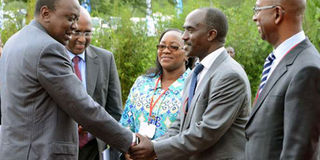African employers urged to create more jobs for youth

President Kenyatta is welcomed to the 2016 African Employers’ Summit in Naivasha by Federation of Kenya Employers chairman Linus Gitahi. Looking on is Safaricom chief executive Bob Collymore (right). PHOTO | MACHARIA MWANGI | NATION MEDIA GROUP
What you need to know:
Employers were told it was important for people with HIV to keep their job as it improved adherence to anti-retroviral drugs (ARVs) by 40 per cent.
Unemployment among young people was identified as a major problem affecting Africa.
Safaricom CEO Bob Collymore said they had created 4,521 formal jobs since last year and 108,000 indirect informal jobs.
African leaders have been challenged to personally champion the creation of robust businesses that will ensure employment opportunities and spur economic growth.
In a resolution by employers drawn across 16 African countries, the participants said improvement of productivity should be adopted as a national agenda across the continent.
Federation of Kenya Employers executive director Jackline Mugo supported the resolutions, saying business leaders in Africa should pursue actions and strategies aimed at improving their productivity.
“African countries should establish and strengthen productivity management institutions. These institutions should be based on tripartite arrangements,” she said.
During the forum, employers were told it was important for people with HIV to keep their job as it improved adherence to anti-retroviral drugs (ARVs) by 40 per cent.
UNEMPLOYMENT CRISIS
Unemployment among young people was identified as a major problem affecting Africa, which has a huge youthful population that is largely illiterate, unskilled, and unemployed.
Speaking during the first African Employers’ Summit at the Enashipai Resort and Spa in Naivasha, President Uhuru Kenyatta, who officially opened the summit, did not mince words when describing the challenge of unemployment.
Mr Kenyatta warned that this was dangerous, calling for urgent redress, including job creation both by the government and the private sector.
“Mass youth unemployment is a crisis and a threat to the stability and prosperity of Africa. It is a crisis so serious as to amount to a fundamental threat,” he said.
The Head of State identified skills mismatch in the jobs market as well as the need to upscale informal jobs into formal ones as the key challenges facing job creation and raising productivity.
“A number of African countries are witnessing robust growth, but coupled with that growth is the challenge of the missing middle, a low number of mid-sized companies that act as a link between the large corporates and the informal sector. There’s also an issue of a skills mismatch among some employers,” noted the President.
He called on the private sector to take up investment opportunities to mitigate the youth unemployment crisis, underscoring the importance of creating an enabling environment suitable for businesses to thrive.
Mr Kenyatta, however, decried bureaucracies that hinder business growth, terming the bottlenecks as impediments to economic growth and job creation.
“I commend the private sector for the many initiatives they have undertaken to support job creation and youth employment — like launching venture funds that provide start-up capital, and implementing policies that ensure organisations are proactively training young people,” said the Head of State.
EASE OF DOING BUSINESS
Mr Kenyatta highlighted steps that the government had taken to improve the ease of doing business, like enhancing national security and improving technical competencies of young people.
“We have adopted youth-friendly procurement policies that have created pools of easily accessible capital for budding young business oriented men and women. We are also committed to realising the kind of regional economic co-operation that expands opportunity for every African,” he said.
Public Service, Youth and Gender Cabinet Secretary Sicily Kariuki said out of 170,000 civil servants, 40,000 of them were not skilled, emphasising on the need “to re-train” and equip them with the necessary skills.
She said more emphasis should be placed on encouraging young people to become self-employed rather than fighting for limited employment opportunities.
Nation Media Group chief executive officer Joe Muganda said: “Personally, I believe we have enough policies in place and the biggest challenge now is how to execute them.”
He said employers were more interested in policies that could deliver and help create employment opportunities.
Safaricom CEO Bob Collymore said they had created 4,521 formal jobs since last year and 108,000 indirect informal jobs.
“These are the real drivers of our country. Why are we alienating them? They should be actively participating in our future,” said the CEO.
The regional director of the International Labour Organisation, Africa, Aeneas Chuma said that on average, African countries have been spending less than 10 per cent of Gross Domestic Product on infrastructure, while other developing countries spend more than double that figure.
He termed the low allocation of funds to infrastructure development as “a long standing barrier to sustained growth in Africa,” despite having a capable workforce.
During a 30-minute question and answer session hosted by Mr Collymore, the Head of State called on African nations to avoid “unhealthy competition” and instead focus on Africa’s agenda 2063.
He said the agenda focuses on Africans being pioneers in technology, authors of innovation, exporters of manufactured excellence, and shapers of the shared future of the world.
He noted that while other continents continued struggling to sustain a slow and ageing populace, Africa was teeming with youthful energy and dynamism.
President Kenyatta later launched a website for Business Africa, the premier employers’ federation for the continent.
During the forum, the Federation of Kenya Employers unveiled its strategic plan, dubbed the Employers Business Agenda, which will run until 2019.





